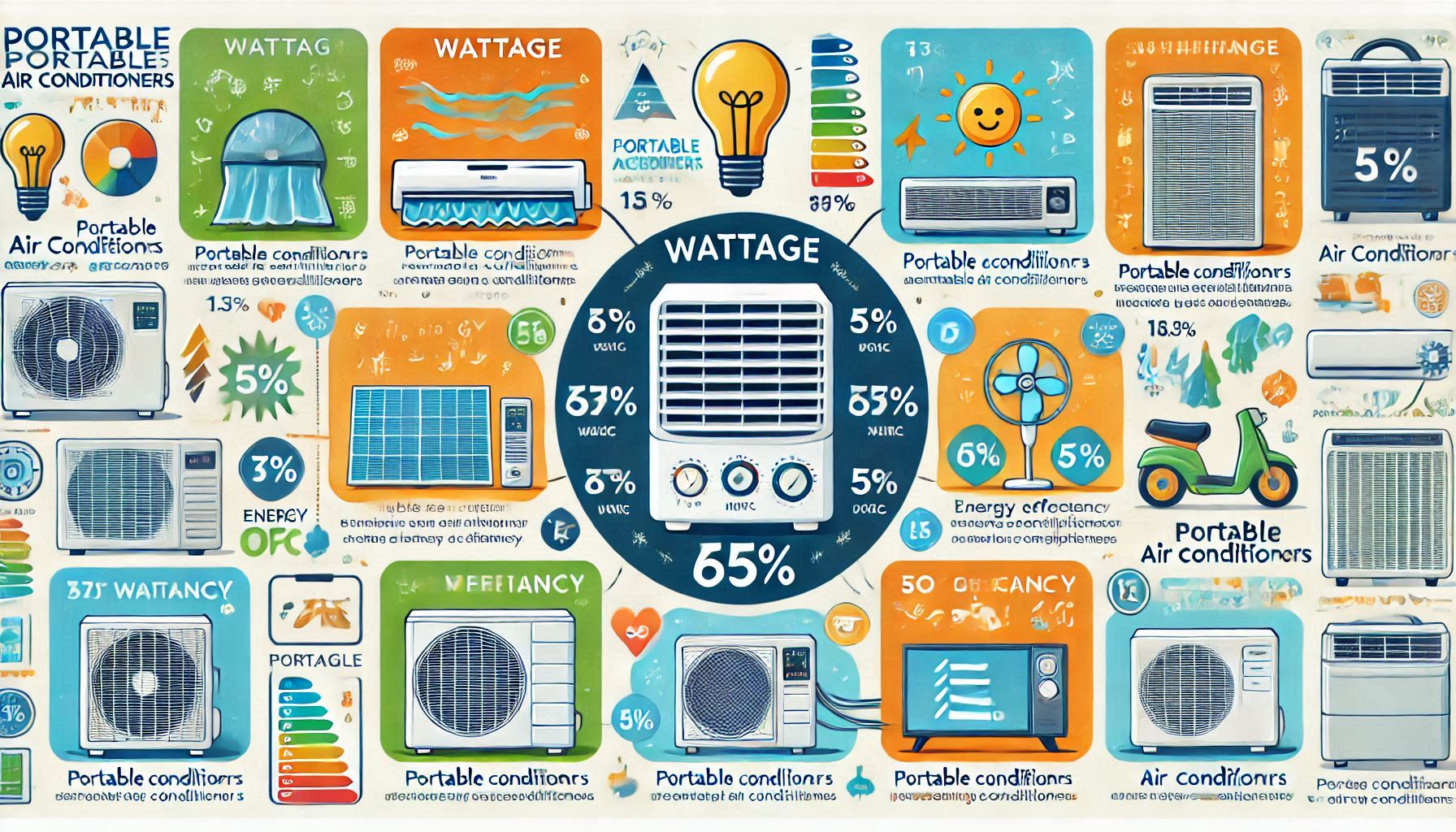Wattage of Portable Air Conditioners: What You Should Know
As the summer heat kicks in, portable air conditioners become a lifeline for many. Understanding the wattage of portable air conditioners is crucial when choosing the right model for your home or office. It determines the efficiency, energy consumption, and cooling power of the unit, directly affecting your electricity bill. In this article, we’ll break down everything you need to know about the wattage of portable air conditioners, helping you make an informed decision for your cooling needs.
What is the Wattage of Portable Air Conditioners?
The wattage of portable air conditioners refers to the amount of electrical power they consume while running. Essentially, it’s a measurement of how much energy the unit uses to cool a given space. The higher the wattage, the more energy the air conditioner uses, which can impact both performance and electricity consumption.
- Low Wattage Models: These are typically used for small rooms or spaces, consuming less electricity but providing adequate cooling for limited areas.
- High Wattage Models: These are more powerful units suited for larger spaces, consuming more energy to offer better cooling performance.
Understanding the wattage of portable air conditioners helps you assess both the cooling efficiency and energy consumption to determine the most cost-effective choice for your specific needs.
Why is Wattage Important When Choosing a Portable Air Conditioner?
Understanding Cooling Power and Efficiency
The wattage of portable air conditioners is directly tied to their cooling capacity. A higher wattage generally means a stronger cooling effect, making it more suitable for larger spaces. For example, a 700-watt portable air conditioner might suffice for a small bedroom, while a 1500-watt portable air conditioner is better suited for a large living room or open office.
Impact on Energy Consumption
While higher wattage provides more cooling power, it also means the unit will draw more electricity. It’s essential to balance the wattage of portable air conditioners with energy consumption. Energy-efficient models, often labeled with Energy Star ratings, provide an ideal mix of power and low energy consumption.
How to Calculate the Wattage of Portable Air Conditioners
To ensure that you choose the right wattage of portable air conditioner, consider the following steps to calculate the wattage required for your space.
Step 1: Determine the Square Footage of Your Room
Start by calculating the size of the room or area you want to cool. Measure the length and width of the space in feet and multiply them to get the square footage.
For example:
- Room size: 12 feet x 15 feet = 180 square feet
Step 2: Use the Right Formula for Cooling Power
As a general rule of thumb:
- For small rooms (up to 250 sq. ft.), a unit with around 5,000 to 6,000 BTU (British Thermal Unit) is sufficient.
- For medium-sized rooms (250–450 sq. ft.), you’ll need a unit with 6,000 to 8,000 BTU.
- For large rooms (450–700 sq. ft.), a 9,000 to 14,000 BTU unit will do the trick.
To convert BTU to wattage, multiply BTU by 0.293 (1 BTU = 0.293 watts). So, for a 6,000 BTU unit, you would need approximately 1,758 watts of power.
Step 3: Choose a Model Based on Your Wattage Needs
Once you have the required wattage, look for models that meet or slightly exceed that number for optimal performance without overloading your electricity system.
How Does Wattage Affect Your Electricity Bill?
The wattage of portable air conditioners plays a significant role in your monthly electricity bill. Let’s break down how wattage influences the cost:
- Smaller units (with lower wattage) use less power but might take longer to cool a space.
- Larger units (with higher wattage) cool faster but can draw significantly more electricity.
Calculating Your Energy Cost
To calculate how much energy your portable air conditioner will use, multiply its wattage by the number of hours it runs, then divide by 1,000 to get the kilowatt-hours (kWh).
For example:
- A 1,500-watt air conditioner running for 5 hours:
- 1,500 watts x 5 hours = 7,500 watt-hours
- 7,500 watt-hours ÷ 1,000 = 7.5 kWh
Now, multiply by your local electricity rate to find the cost of operation. If the rate is $0.12 per kWh, your cost will be:
- 7.5 kWh x $0.12 = $0.90 per day.
By understanding the wattage of portable air conditioners, you can make smarter choices and reduce unnecessary costs.
Choosing the Right Wattage for Your Needs
When selecting a portable air conditioner, the wattage should be aligned with your cooling needs and budget. Here are some tips to help you choose:
- For Small Rooms: A unit with 500 to 1,000 watts is ideal for bedrooms, small offices, or studios.
- For Medium Rooms: A 1,200 to 1,800-watt model works well in living rooms or medium-sized offices.
- For Large Spaces: Consider a 2,000-watt or higher unit for larger open spaces or multi-room setups.
Always remember that selecting the right wattage of portable air conditioners can ensure efficient cooling and prevent overuse of energy.
Energy Efficiency and Wattage: Finding the Balance
Why Energy Efficiency Matters
While higher wattage portable air conditioners can cool a larger space faster, it’s important to strike a balance between wattage and energy efficiency. Energy Star-rated models use advanced technology to reduce power consumption without sacrificing cooling power.
Look for features like eco-friendly refrigerants, programmable timers, and energy-saving modes that help reduce electricity usage while maintaining optimal performance.
Common Misconceptions About Wattage of Portable Air Conditioners
There are some common misconceptions when it comes to the wattage of portable air conditioners. Let’s clear a few things up:
Misconception 1: Higher Wattage Equals Better Performance
While higher wattage does generally mean better cooling, it’s not always necessary for smaller spaces. Opt for the wattage that matches the size of the room for the most efficient and cost-effective cooling.
Misconception 2: All High-Wattage ACs Are Expensive to Run
Some high-wattage air conditioners are energy-efficient and designed to keep costs down. Be sure to check for an Energy Star rating before making your final decision.
Final Thoughts on Wattage of Portable Air Conditioners
Understanding the wattage of portable air conditioners is essential for choosing the right unit for your home or office. By calculating the wattage needed based on your room size and balancing it with energy efficiency, you can enjoy the benefits of cool air without worrying about high energy bills.
Imagine you’re setting up your solar power system, eager to harness the sun’s energy. One crucial factor in maximizing the efficiency of your setup is understanding how the paralleling strings PV amperage affects your solar panels’ performance. Ensuring your solar array is optimized for peak efficiency can make all the difference in the long run. For more insights on improving your solar power system, learn how to boost solar power efficiency and adjust your system for maximum energy output.














Post Comment